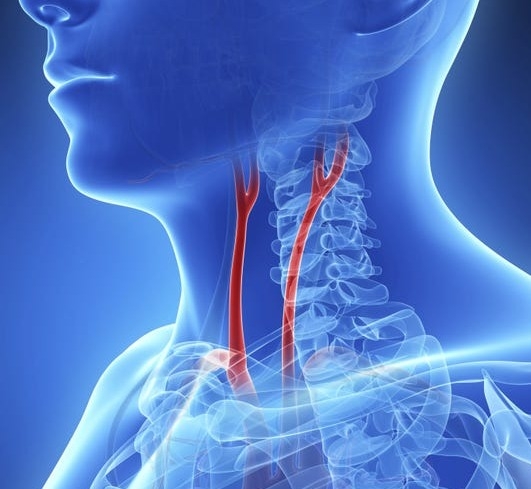Health Tips to Avoid Carotid Artery Disease
By Kara Heer
Health Tips to Avoid Carotid Artery Disease
What are your carotid arteries and what do they do?
Your carotid arteries are the major blood vessels that deliver blood to your brain. One carotid artery is located on each side of your neck. When your doctor puts their hands on your neck to detect a pulse, they’re feeling one of your carotid arteries. Carotid artery disease occurs when a blockage in one or both arteries, the amount of blood flow to your brain is decreased. This can lead to a stroke.
Treating CAD
If you have been diagnosed with carotid artery disease (the disease process that causes most strokes), lifestyle changes and medications will be an important part of treatment, even if you have had a procedure to restore blood flow to your brain. Lifestyle changes can be difficult to make, but they are well worth the effort. Making positive changes in diet, exercise and personal outlook can have measurable beneficial effects on risk factors such as high blood pressure, cholesterol, and body weight. If you have already had a stroke or a procedure such as carotid artery angioplasty and stenting or carotid endarterectomy, lifestyle changes can help with your recovery and prevention of future problems.
Risk Factors for Developing CAD
Risks for developing carotid artery disease include smoking, type II diabetes, hyperlipidemia (high cholesterol), and hypertension (high blood pressure) are typical of most arterial diseases. However, there are some other factors that may contribute to a higher incidence of carotid artery disease. Males ages 55-85 and post-menopausal women have the highest risk of complications from a carotid blockage. Obesity alone predisposes patients to the development of hypertension, type II diabetes, hyperlipidemia. It also has been shown to play a direct role in initiating atherosclerosis (hardening of the arteries) which affects how well the vessel functions.
Lack of physical activity also contributes to carotid, as well as cardiovascular (heart) disease and increases mortality (risk of death). Genetic predisposition to atherosclerosis can also be linked to families where high blood pressure and high cholesterol are present. Those with generally poorer health quality due to lower socioeconomic conditions, depression, social isolation, and high levels of stress may be more prone to develop symptoms of carotid disease progression. While some risk factors are inherent such as sex, age, and genetic makeup, other factors such as weight control and healthy diet, stopping smoking, increasing physical activity, and regular healthcare utilization can have a big impact on a person’s overall health.
For severe blockages in the carotid arteries, lifestyle changes and medication alone will not be sufficient treatment to reduce the risk of future strokes. A vascular trained physician should evaluate you to determine the severity of the blockages and discuss which treatment makes the most sense for you based on your patient history and risk factors.
